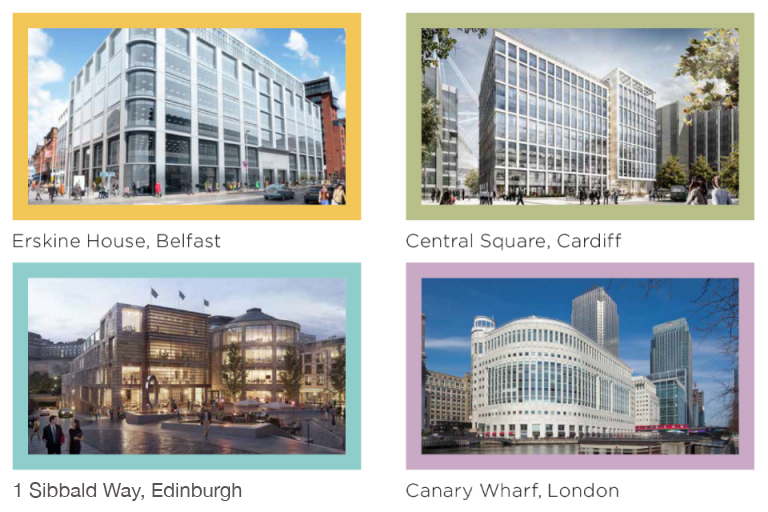
Last month saw the official opening of the Government’s Canary Wharf Hub by Oliver Dowden, Minister for Implementation. This seems like a good opportunity to reflect on the Government Estate Strategy 2018, and the great progress towards transforming our government estate to prepare for our future ways of working.
In March this year we reported that at the end of the financial year 2016-17 the total annual operating cost of running the Central Estate was £2.57 billion. This represents a 1.4% reduction in real terms on the previous year’s total of £2.55 billion, and demonstrates the efficiencies available from consolidating our estate and improving how we use our space.
However, the Estate Strategy goes deeper than reducing costs and rationalising our estate. It’s about making our property work better for us, supporting us to be a brilliant Civil Service. For the citizens we serve, it helps public services meet customers’ needs, generates more land for housing, and drives regional growth and opportunities. The Government Hubs programme is a key part of bringing this forward-looking vision into reality.
Fourteen hubs have been announced so far, including in the capital cities of London, Edinburgh, Cardiff and Belfast. By the end of this Parliament, we’ll have 20 up and running around the UK. This is feeding into our target of reducing government-owned office buildings from 800 to under 200 by 2030.
 The majority of the hubs will be located outside of London, as part of the Estate Strategy’s drive to stimulate regional growth. This is an essential part of the Places for Growth programme, which works with departments and arm’s length bodies (ALBs) to relocate public sector roles across the UK, including the devolved nations, and away from London and the South East. By 2022, a thousand roles will be moved out of London, with thousands more by 2030. The future Civil Service, right up to senior grades, will be located closer to the communities that they serve.
The majority of the hubs will be located outside of London, as part of the Estate Strategy’s drive to stimulate regional growth. This is an essential part of the Places for Growth programme, which works with departments and arm’s length bodies (ALBs) to relocate public sector roles across the UK, including the devolved nations, and away from London and the South East. By 2022, a thousand roles will be moved out of London, with thousands more by 2030. The future Civil Service, right up to senior grades, will be located closer to the communities that they serve.

We are developing plans for clusters in health, transport and culture in the cities of Leeds, Birmingham and Manchester, respectively, with exploration of sport, prison scrutiny and regulatory clusters also underway. As part of our preparations for leaving the EU, we will be looking for opportunities to locate repatriated functions across the whole UK.
With the 2019 Spending Review also on the horizon, departments and their ALBs are planning ahead, and are being asked to identify suitable roles for relocation, relying primarily on natural churn, rather than relocating people. The Places for Growth Team will then support them in finding the location that most closely matches the skills they require with the local labour market and the regional economic and industrial priorities. The Civil Service needs to attract employees from talent pools all around the UK to remain at the top of its game and be an increasingly diverse and inclusive place to work. Through these programmes we will lower our people and estates costs and, using co-location, we will help to reduce siloed working between departments.
Both these initiatives are underpinned by Smarter Working. Smarter Working enables civil servants to make the right choice about where and when they work, bringing with it a better work-life balance. This, in turn, offers a wealth of potential benefits, from improvements in health and wellbeing to greater collaboration and productivity.
 I want the Civil Service to be at the forefront of this modern way of working; helping us retain and recruit talent, and getting the best people for the job from across the UK. By using our property more effectively and adapting our culture and behaviours, such as through our use of technology, we can improve our outputs. This is better for the taxpayer, too. We expect that, by 2020, 70% of the Civil Service will be smarter working, and that by 2022, we will all be working in this way.
I want the Civil Service to be at the forefront of this modern way of working; helping us retain and recruit talent, and getting the best people for the job from across the UK. By using our property more effectively and adapting our culture and behaviours, such as through our use of technology, we can improve our outputs. This is better for the taxpayer, too. We expect that, by 2020, 70% of the Civil Service will be smarter working, and that by 2022, we will all be working in this way.
We’re working hard to realise our new vision of the Government Estate, bringing the Civil Service closer together and to the UK as a whole.
For more information on Places for Growth, watch the video here.

3 comments
Comment by Richard Graham posted on
Hi Stuart. As a member of Jamie's team I am happy to confirm that the same principles apply to all of us, irrespective of grade.
People often think smarter working is all about "hot-desking" . Or they think its about working from home but it’s not really either. Or say it’s all about the IT. It’s not. It’s actually about changing how we think about work.
People tend to be more motivated and productive if they can work in a way that suits them best so the best employers equip and empower the individual, who then decides how, where and when to work. What you need to make this work, more than anything, is trust. Once you feel trusted, it helps you do your job better. You feel empowered, which gives you credibility. And that makes you more effective.
The new Government Estates Strategy requires all Civil Service organisations to adopt the BSI Code of Practice for Smart Working (PAS3000) by 2022 . As a business driven initiative it will need to differ across organisations and between different teams, but the key principle is flexibility becoming the default for the Civil Service, for everyone – people at the front line as much as those sitting in Whitehall; footsoldiers and generals alike!
Comment by Stuart H. posted on
An interesting link to the article by Jamie Turner, though the article makes no mention of his grade. He is, I believe, a Deputy Director.
So my question is this: how much will Smarter Working, and the ability to "make the right choice about where and when they work, bringing with it a better work-life balance" apply below SCS ranks? Will an HO in Jamie's team have the same freedom to organise their lives? Will Officers have the same ability to count their (working) commute as part of their hours?
Or will Smarter Working be restricted to the higher grades?
I would be grateful for a definite statement of position from the Civil Service that the Estate program will lead to increased flexibility across the WHOLE of the Civil Service.....and will not, in practice, just mean "more time at home" for the generals, and "extra 2 hours daily commute" for the footsoldiers.
Comment by David Nethercott posted on
Stuart H: I can't comment on the whole of the Civil Service , but here at Porton Down (Defence, Science and Technology Lab, part of the MOD), Smarter Working very much applies to everyone at all grades. In fact, it's the more junior grades that tend to make more use of working from home etc. than do the senior managers. Possibly senior roles involve more face to face working perhaps? I don't know.